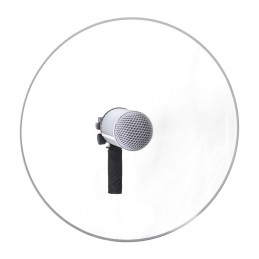- Bags & Harnesses
- Blowout Items
- Boom Poles
- Cables & Adapters
- Carts
- Cases
- Communications
- Computer Audio
- Deals
- Expendables
- Grip
- Headphones, Headsets & Earsets
- Interfaces
- Microphone Accessories
- Microphones
- Miscellaneous
- Mixers & Preamps
- Parts
- Power
- Recorders & Players
- Speakers
- Time Code & Sync
- Video
- What's New
- Wireless
- Used Audio Equipment
Schoeps Parabolic Dish Set

Sales SKU: SCHDISH-CCM2|SCHDISH-CCM4|SCHDISH-CCM21
Product Code: 163203 | 163201 | 163202
A parabolic dish is an extraordinary tool in the hands of a skilled sound engineer since it achieves surprisingly high directivity at high and medium frequencies with relatively simple means. With Schoeps Parabolic Dish Set consisting of a special OEM parabolic dish from Telinga and a Schoeps CCM microphone (choice of 3), these characteristics can fully be realized.
Schoeps has made significant improvements in combatting some of the disadvantages a parabolic dish system poses by taking certain innovative measures. Case in point: the enormous directivity of a parabolic dish often comes with a very unbalanced frequency response, which also varies widely for different directions of sound incidence. This usually leads to a clear coloration. To overcome that, the Schoeps Parabolic Dish Set uses a matched system. The microphone position is designed to produce a smooth frequency response (unusual for a parabolic system) for the three CCM microphone types available. Although the frequency response is now smooth, it is not yet even, so must still be equalized. This is automatically achieved with a free plugin, ParabolEQ. The plugin performs filtering based on the entered application parameters, producing a flat frequency response between 100 Hz and 20 kHz. The correction curve is visualized accordingly.
Wind Protection
The Schoeps Parabolic Dish Set comes with a Rycote windscreen which allows high attenuation of wind noise on the microphone. The optionally available High Wind Cover or—if the parabolic dish must be transparent—the included fur Windjammer provide further damping of strong wind. If the inevitable wind noise on the dish itself is low enough for recording, disturbances to the microphone are, thus, reliably avoided.
CCM Compact Microphone
The CCM microphone options are:
- CCM 2 - omnidirectional
- CCM 21 - wide cardioid
- CCM 4 - cardioid
Each type leads to different results and properties of the system, so choose wisely.
The CCM 2 (omni) is the usual microphone for recording with a parabolic dish. This type of microphone causes fewer problems with handling and wind noise. The directivity is good and the recording of very low frequencies is possible—although without directivity—but at a good level. This can be an advantage if low-frequency ambience is desired. The frequency response is not so even compared to a cardioid due to the high level of the signal on the unwanted direct path between source and microphone.
The CCM 21 (wide cardioid) is a good compromise between the advantages and disadvantages of omni and cardioid. Wind and wind noise are a little more damped compared to the cardioid and the directivity is higher than when using an omni.
The CCM 4 (cardioid) achieves the best directivity and the most even frequency response (due to the highest suppression of the direct path between source and microphone). However, there can be handling noise when the dish cannot be kept still.
It is important that all CCM microphones are mounted with their 0° direction pointing towards the dish.
Setup & Transport
Transport of the system is very easy because the dish can easily be folded without disassembly of the components. If the entire system is disassembled, the dish can be rolled up and stored in the optional soft case/bag. For the remaining accessories, a Pelican hard case is also optionally available.
The CCM microphone can be easily changed. Furthermore, an XLR output in the handle also allows the system to be connected to a standard microphone cable. For details about the setup of the system and the positioning of the microphone, please refer to the operator's manual.
Package Includes
- CCM (2, 21, or 4) incl. premium box, SGC clamp, K 5 LU (5 m adapter cable, Lemo to 3-Pin Male XLR with cable strap
- Transparent OEM Telinga parabolic dish 22", foldable
- Handle including the fixed microphone cable
- Microphone holder with Rycote windshield (mounting kit included)
- Rycote Windjammer








